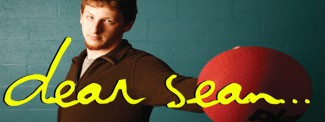Dear Sean,
I'm a student at California Polytechnic State University and I am planning on giving a speech about four square, simply because it is a silly personal interest of mine. I am looking for an expert opinion, that i could possibly cite in my speech, on different aspects of the sport. I was wondering if there is anything else not mentioned in your web site that would be interesting for a class of college students to hear. If you happen to know any history of the sport itself, not necessarily the league, then that would be helpful. Please get back to me with any information you have as soon as possible. Thank you!! - Emily Conklin, 2/10/08
Hi Emily, thanks for the note. I can probably help you out with this since I'm such a big fat enigma in this funny little sport, and I don't mean that in a rhetorical way at all. Running this little gig that is based on a sport with no documentation makes us an official and trusted source on this game. Seriously, we are sought out for answers to some pretty crazy things And, well, here you are.
What is hard to pin down, and might be interesting to your talk, is to speculate on how four square became so popular without having a rule book in circulation, or a unique equipment requirement to market, or even an iconic celebrity to tout it. The origins might not ever become clear but its so obvious is that this game was invented by kids and transmitted by adults.
I personally think that the game was born on the urban sidewalk and used summer camps as a vehicle for dispersal. I have a theoretical model for how this four square meme might have spread and mutated:
- It starts as a game once called "sidewalk square" since a lot of hopscotch and handball varieties are based on the millions of sidewalk squares there are in any given city or suburb. Many people I have spoken with say they first encountered this game on a sidewalk and played with a cheap, easily acquired tennis ball.
- So this game gets a little traction in a neighborhood or in a school playground, and some teachers or recess monitors start to notice it. Its fun, fast, easy to regulate, or the opposite, it creates fights, animosity, bad sportsmanship, etc. Either way it becomes something that educators talk about at meetings, conferences and workshops.
- Somewhere along the timeline, this game gets written up in a list of great activities for youth and gets photocopied or printed and suddenly educators and youth workers and (here is where I think its most important) youth summer camps read about it.
- There was a great proliferation of books on "new games" published in the 1970's and early 80's that featured new creative, interpretive and educational games, as well as teambuilding and trust-fall activities for kids. They were heavily mined by summer camp staff building out a season's worth of programming, and thus kids from Montana and Kentucky and Idaho were taught by camp staff to play a game invented by kids in New York or DC.
- And once the summer camps had it in their blood, the game went back home with the thousands of international seasonal employees that are brought to the states to add diversity and perspective to a well balanced summer camp program. English speaking nations like Australia and the UK are heavily recruited for summer camp staff and this may (or may not, I'm speculating all of this) have lead to the migration of this game across the oceans.
I hope this can give you a few extra minutes of talk time in your speech, and maybe incite you to do a little origin hunting. Don't bother pouring over the web for answers since we already looked, didn't find them either, and eventually wrote the Wikipedia article ourselves.
If you wanted to do a little leg work, you could look for those New Games genre of books and try to find the earliest edition with any mention of four square, king square, knock out, or even sidewalk square. I know I read a few books like this that featured some schlocky looking dude in bell-bottoms on the cover posing as a hip youth work from a long forgotten decade, and yet the activities were spot on. If you had access to a phys-ed teacher's or an outdoor eductator's library then you might find something.
Good luck on your talk, let us know how it goes.

